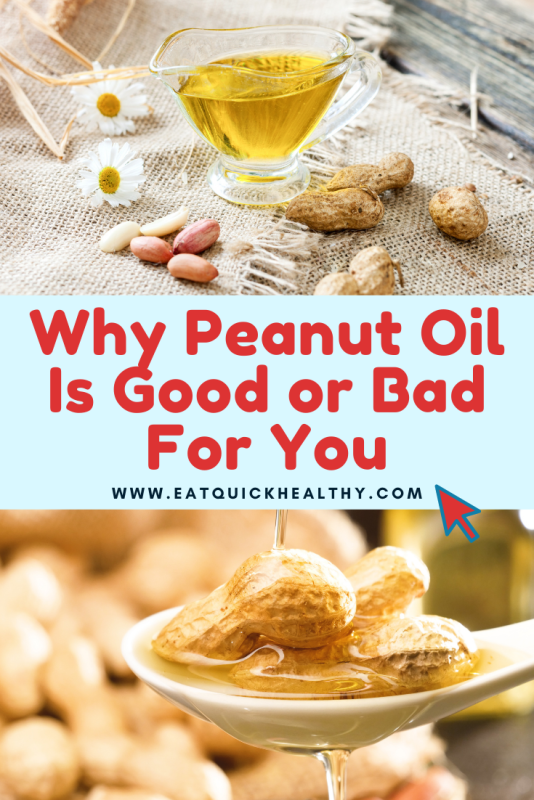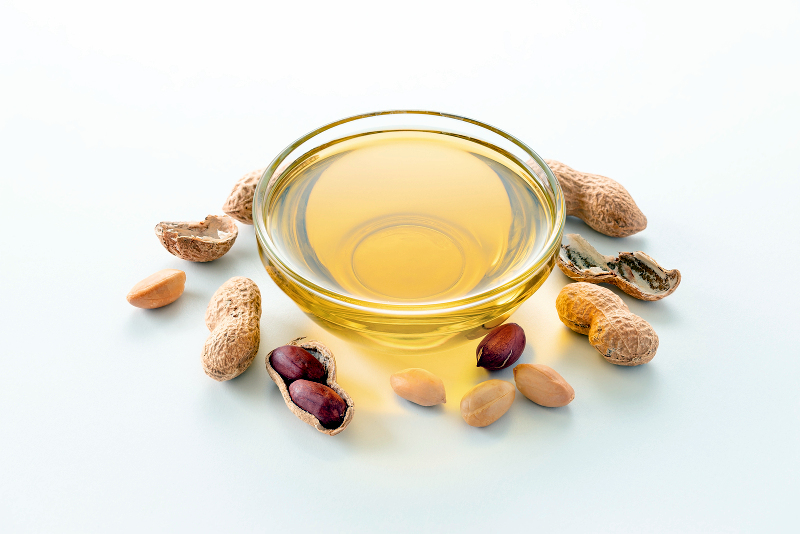Are you considering buying peanut oil, but want to know whether it’s bad for you or not? We have the answer here! As well as answers to other questions that will help you understand the pros and cons of peanut oil from a health perspective.
In this article, we’ll go over what peanut oil is, whether or not peanut oil is good or bad for you, as well as the different kinds of peanut oil.
Once you have finished reading through all of the following sections, you’ll have new knowledge about peanut oil that will help you make an informed decision about using the oil or not. So, if you’re ready, continue to the next section!

What Is Peanut Oil?
Peanut oil, also known as arachis oil and groundnut oil, is a popular, vegetable-derived cooking oil and ingredient that is made with, you guessed it, peanuts!
And if you’re wondering, “is peanut oil good for frying,” then you’ll be happy to hear that it absolutely is. In fact, peanut oil is preferred by many for deep frying. The refined version of peanut oil has a smoke point of 450 degrees Fahrenheit and can be used several times before being discarded. It doesn’t absorb the taste of food either, which is key for a good frying oil.
Typically peanut oil has a nutty taste to it which ranges in depth depending on the kind you buy. So, be aware of that if that’s not what you’re looking for. Also, if you are allergic to peanuts, most kinds can spark up an allergic reaction. Refined peanut oil usually won’t, however.
This oil is composed of around 50% monounsaturated fat, 32% polyunsaturated fat and 17% saturated fat. Monounsaturated fat and polyunsaturated fat are considered “healthy fats,” while saturated fat is known as an “unhealthy fat.”
But as you’ll find out in this blog, even polyunsaturated fats can have negative downsides, even though it’s coined a healthy fat.

Types Of Peanut Oil
When you go into the grocery store hunting for peanut oil, you may come across a variety of different kinds. They all serve a purpose, with some being great for high-temperature cooking or low-temperature cooking, while others will save you some money.
Here is a brief list of the different types of peanut oil:
Refined peanut oil: Arguably the most popular version of peanut oil, refined peanut oil is fantastic for frying. As mentioned earlier, refined peanut oil has a 450-degree smoke point. It doesn’t absorb the taste of food and it can be used multiple times before having to be discarded.
Also, refined peanut oil typically has a neutral taste to it, so your meal won’t be altered in that way.
Gourmet peanut oil: Boasting a nutty taste, gourmet peanut oil is usually unrefined and is great as a finishing ingredient.
Peanut oil blends: As the name suggests, you can also purchase blended peanut oil. The oil is mixed with another oil that tastes around the same. It’s one of the cheaper ways to add peanut oil to your frying regimen.
Cold-press peanut oil: This is a low-heat oil that has retained more of its nutrients relative to refined peanut oil. It also has a potential peanut taste.
Is Peanut Oil Bad For You?
Now it’s time to answer your main question: “why is peanut oil bad for you?” There are pros and cons to consuming peanut oil, specifically from a health stance. So, it’s not all bad. However, there are health consequences, just like with most cooking oils on the market.
And we’ll outline some of the reasons peanut oil is bad for you in the section below:
Why Is Peanut Oil Bad For You?
Before we explain some of the reasons why peanut oil is bad for you, it’s important to remember that science and research are always evolving, which includes nutritional standards and norms. Our list of the good and bad aspects of peanut oil comes with that caveat.
But as promised, here are the main reasons why peanut oil can be bad for you, according to the newest research:
Peanut Oil is High in Omega-6 Which Is Not Healthy
A component of peanut oil is omega-6, a fatty acid that has been linked to several health consequences. Omega-6 can cause inflammation in the body. The research isn’t finished on this, but evidence suggests that there is a correlation between high levels of omega-6 consumption and an increase in inflammatory diseases, like obesity, heart disease and cancer.
Specifically, there are a variety of studies that have been released that show a relationship between omega-6 and an increased risk of women developing breast cancer.
Now, just because you consumed peanut oil doesn’t mean you’re automatically going to suffer from the ailments listed above. Moderation is key, as well as a healthy diet. So make sure you’re not overusing peanut oil and ensure you’re eating healthy, whole foods.
Some Peanut Oils Will Cause an Allergic Reaction
Now, this one may be obvious to you. As we mentioned at the start of this blog, peanuts are derived from a peanut plant and used to make peanut oil. If you have a peanut allergy, it’s best to stay clear of peanut oil to avoid sparking up an allergic reaction. Typically refined peanut oil won’t cause a reaction, however, due to the way it’s manufactured. But, different gourmet and cold-pressed peanut oil will likely trigger your allergies.
If you don’t know whether or not you’re allergic to peanuts, and you never include peanuts in your diet, it may be best to contact your doctor before trying any unrefined peanut oils.
The Oil Could Oxidize & Cause Damage to Your Body
Because peanut oil is highly composed of polyunsaturated fats, there’s a risk of it oxidizing when it’s heated. In layman terms, if you consume something that has undergone the oxidation process, your body could be susceptible to free radical damage, which can cause issues and usher in things like premature ageing and cancer.
Is Peanut Oil Good For You?
As mentioned earlier, peanut oil isn’t all bad. There are actually a lot of great benefits to consuming peanut oil. It is mostly composed of monounsaturated fats and polyunsaturated fats, which are known as healthy fats that could help keep you in tip-top shape.
You’ll also find vitamin E, a key antioxidant, in peanut oil, which has a ton of upside to consuming and using.
In the next section, we’ll outline some of the best reasons why you should consider adding peanut oil to your pantry from a health perspective.

Why Is Peanut Oil Good For You?
So, you were wondering “is peanut oil good for health?” Don’t forget, these are the most up-to-date theories and science behind peanut oil’s positive benefits, and they’re subject to change.
Here are some of the biggest reasons it is good for you:
Your Skin & Hair Will Thank You
The oil contains vitamin E, which is fantastic for maintaining your skin and hair, helping with things like signs of ageing as well as fighting blemishes and wrinkles. And you don’t only have to consume peanut oil. It’s used as an ingredient in a lot of cosmetic products that you can use topically.
You can read more about using it on your hair here and on your skin here.
It Helps Regulate Blood Sugar for Diabetics
If you’re a diabetic, then you understand that it’s critical to regulate your blood sugar. And due to the high level of unsaturated fat in peanut oil, your blood sugar levels could be impacted in a positive way.
Further, there are some studies that show eating more polyunsaturated fats compared to saturated fats can help your body’s insulin secretion abilities, which is also a great thing to aid in regulating blood sugar levels.
Peanut Oil Can Support Your Heart’s Health
We don’t need to explain to you why having a healthy heart is extremely important. And because of the high amount of vitamin E and healthy fats in it, peanut oil has been linked to potentially helping support heart function.
Also, some studies have indicated that vitamin E can shield your body from potential free radicals, protecting you from things like heart disease and different kinds of cancers.
Conclusion
Now that you’ve gone through this blog, you’ll hopefully understand that peanut oil isn’t all good or all bad. There are positives and negatives to consuming peanut oil, and it’s up to you to weigh up the pros and cons.
This vegetable-based oil has a high amount of omega-6 and polyunsaturated fat, which have been linked to negative health consequences. But on the other end, it also has vitamin E, which has a bevy of benefits. And polyunsaturated fats also have an upside.
One of the biggest key takeaways to remember from this blog is that moderation is key.
If you ever have any more questions about consuming peanut oil, or any sort of oil or food, your best bet is to contact a nutritionist or doctor. Everybody is different and every body is different.
And if you decide that you want to try out peanut oil, there is a long list of different kinds that will surely up your cooking game and culinary experience.
Want to learn more? Click here to learn how to make your own peanut oil or here for the benefits of using peanut oil on your skin and here for using it on your hair. You can find all our guides to peanut-related products here.


Comments are closed.